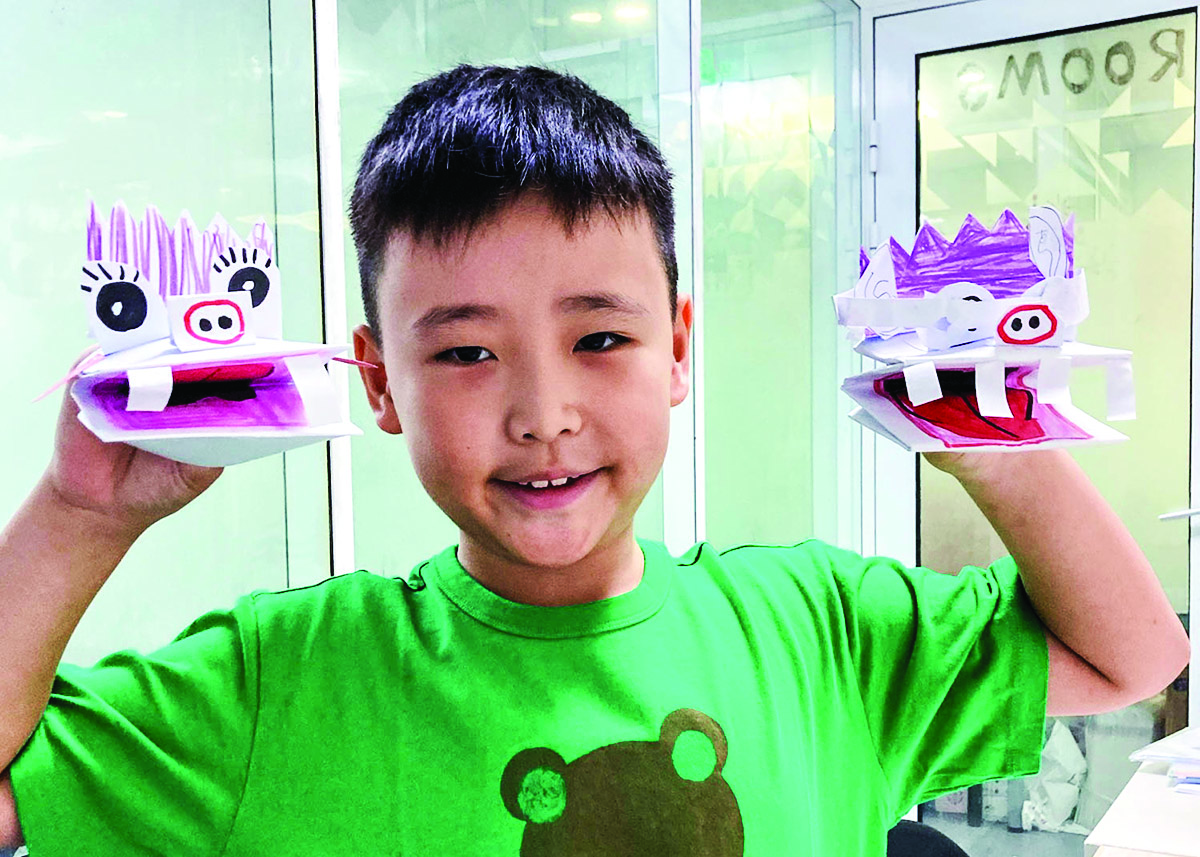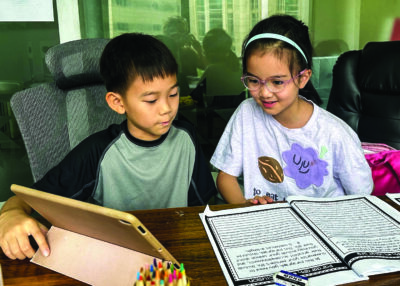Nancy Edmonds Hanson
- Moorhead teachers Rebecca Meyer-Larson and Paul Larson pose in the lobby of the Super J educational program on their first day of school in Beijing, China.
- The Larsons worked with youngsters between third grade and middle school, like these two young English students.
- Rebecca Meyer-Larson, who teaches speech at Moorhead High, explores Chengdu after her 38-hour flight around the globe.
- Beijing, China, as photographed by Paul Larson in July.
Come Monday, Rebecca Meyer-Larson and her husband Paul will complete a 38-hour flight crossing one-third of the globe. They’ll board their plane at 2 a.m. and – if flights are on time – arrive at Hector Airport at 9 p.m. the same night.
It’s the kind of topsy-turvy experience that has marked their summer sojourn as teachers in Beijing, China. When the Moorhead teachers set out July 18 to offer American-style learning through Jumpstart Education or Super J, a Chinese supplemental education company, they were embarking on an eye-opening adventure in a system light years apart from the one both know so well in Moorhead – yet with students who, Rebecca says, “are just like the kids anywhere.
“I still have to tell them to get off their iPads.”
Rebecca teaches speech, directs theater and coaches Moorhead High School’s national award-winning speech teams. Paul retired recently after a career in elementary education, most recently at Dorothy Dodds Elementary School. This summer, the pair were on board for a chance to experience something entirely new.
“We didn’t apply to Jumpstart. We were recruited,” Rebecca says. The Chinese company, owned by a woman who attended the University of Southern California and Berkeley, offers supplementary educational services for elite families who want their children prepared to study abroad someday in the U.S., England or Australia. “They contacted us back in March, ‘Are you interested?’” the Moorhead educator says. “We researched it and thought, ‘Why not?’”
Jumpstart, she explains, is nothing like a traditional school. “This is a business. We’re surrounded by a whole floor of companies offering coaching on college admissions, SAT preparation, and other supplementary education for pay,” she emphasizes.
“There are no classrooms.” Instead, they and two other Americans contracted by the firm have been teaching two three-hour sessions – one morning, the other afternoon – in an office building. Sessions are conducted in 6-by-8-foot cubicles furnished with a table instead of desks.
Small groups of perhaps four youngsters crowd around that table for their lessons. They interact with their American teachers – and each other – exclusively in English. In that respect, the program is similar to Moorhead’s Spanish immersion. But Rebecca cautions that, unlike the Moorhead program’s open enrollment for all students, Jumpstart enrolls children from only the most elite of Chinese families.
“Their parents want them to get a Western-style education,” she points out. “These are China’s high flyers. They hope these kids will go to school at the finest universities – Berkeley, Harvard, Oxford. But the Chinese education system is very different. When they arrive, they’re shy and intimidated. Companies like Jumpstart brings them a taste of western ways … an opportunity to be educated in very different ways.”
While the Larsons expected to be working with middle- and high-school-age students, they found their classes ranged considerably younger. “It depends on who signs up,” Paul reports. “We ended up with children roughly between third and eighth grades.”
The youngsters have been introduced to mini-classes on widely varied topics. For Rebecca, that has included classic children’s literature, “arts alive” and “wax museum;” the historical figures her four students focused on included Wayne Gretsky, King Tut, Jane Goodall and cartoonist Stan Lee. (She explains, “His first choice was Spiderman, but I talked him out of it.”) Paul too has done “arts alive” too, as well as sessions about endangered species and other topics. His wife recently heard him singing a classic with his students in his nearby cubicle – “Yellow Submarine.”
The Larsons have been staying in the JingYi Hotel, located in what’s known as China’s Silicon Valley. With menus exclusively in Chinese, mealtime has been interesting. “Thank goodness for coffee,” Rebecca says, “coffee and eggs.” Deciphering the rest of the menu, translated from Chinese to English via an online app, has been less successful. “At breakfast, somehow ‘pig intestines’ doesn’t sound very good,” she notes, adding, “though I guess that is as good a description of sausage as any.”
She continues, “When you’re traveling internationally, we kind of expect English-speaking staff. That’s not the case here. Just this morning, we were trying to use the app to ask, ‘Where are our shirts?’” She laughs. “That’s where my theater skills have come in handy. I do a lot of pantomime.”
For two Americans accustomed to hometown ways who speak no Chinese, every moment can be drenched in culture shock. But some of those involuntary lessons are not just different: They have been positive.
They cite the dramatic difference in how teachers are regarded in the Asian nation. “This is not the way we’re regarded at home,” Paul says. “Parents show a lot of reverence for what we are doing for their children.”
Rebecca tells of asking whether books could be ordered for her “wax museum” class. “I sent a text at 8 a.m,” she says. “By noon, they were on my desk.”
On the other hand, they have encountered perhaps-unexpected tech problems in Beijing. “Google, Youtube and other sites I use for class preparation are outlawed here,” she says. Her husband adds that Wifi is undependable, or worse: Both swear they’ll never complain about the technology available in Moorhead again.
Their reception, Paul emphasizes, has been warm and friendly. Rides have been set up to get them from hotel to Jumpstart and back. “You really have to trust the people around you when you only have an app to communicate directly,” he points out. “They have made it easy. These people have made us comfortable.”
As for their young students, both agree that the grueling Chinese education system is serious work. Besides taking two three-hour classes a day at Jumpstrt, their summer students not only accept, but expect homework every day. “Even the very young students work very, very hard,” Rebecca observes. “That’s what this culture is about. Work.”
Beneath that focus, though, she says, “Kids are kids. Some of these students are sweet and happy. For others, three hours is an awfully long time, and it shows. It’s just like back at home.”
When the Larsons finally step off their plane in Fargo Monday night – after sitting 38 hours in economy class on Air China and Delta flights – they’ll plunge back into the familiar world of deadlines and (for Rebecca) back-to-school preparations. Their first task a couple days later: Accompanying son Peyton to Western Kentucky University to start his sophomore year. Then, after flying to Colorado for a concert at Red Rocks, Rebecca will be welcoming her Minnesota students on Aug. 19. Meanwhile, Paul will be getting ready to carry on teaching the offspring of China’s most privileged class, this time via Jumpstart and that reliable Moorhead wifi.
What’s Rebecca most looking forward to when they finally arrive home? “I’m going to enjoy my coffee,” she says. “I’ve been struggling to find good coffee ever since we got here.”







